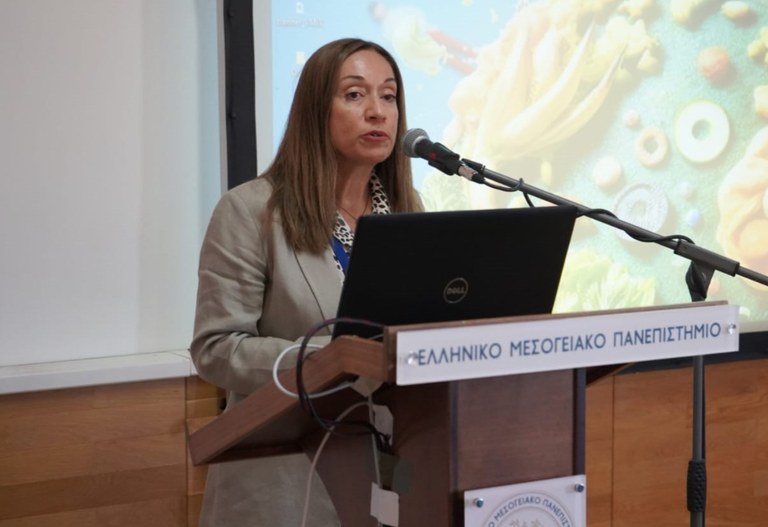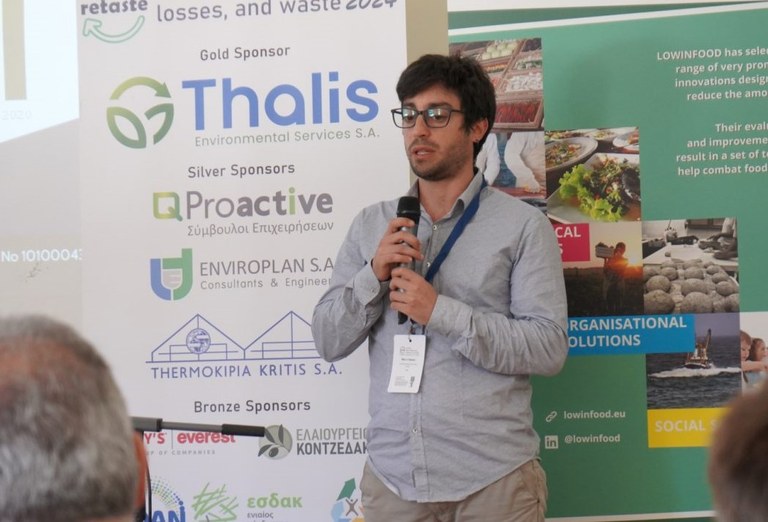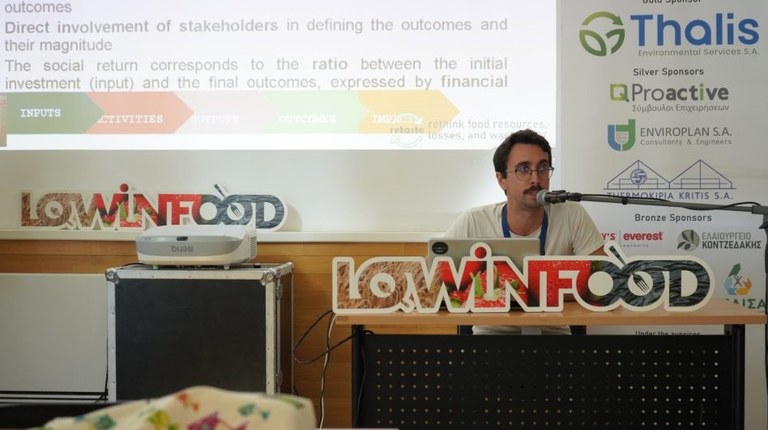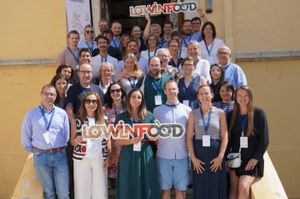Last General Project Meeting for Lowinfood project in Greece
The final General Project Meeting of Lowinfood, a project funded through the European Union’s Horizon 2020 research and innovation programme, took place in Archanes (Crete) from September 24th to 26th, 2024.
During the first day, the members of Lowinfood Consortium discussed the project’s progress and the results obtained, and after the meeting Retaste event started in the same facilities of Archanes. The objective of this two-days international conference is to bring together researchers from different research fields and discuss strategies and applications to increase sustainability and circularity in the food supply value and afterlife chain.
The topics of Retaste conference were strictly related to Lowinfood project, so many researcher of the Consortium were included as speakers in the congress agenda or chaired some of the parallel sessions.
Lowinfood final project meeting in Crete
The final meeting of Lowinfood project, which is going to end in February 2025, was organized by Harokopio University partner in Archanes, a charming ancient village located in the heart of Crete.
The innovations about food waste prevention to be tested and quantified during the project were technological tools and devices as well as organizational and managerial solutions: they had been developed both by companies (i.e. market-oriented) and institutions, such as the S.I.R. software of Emilia-Romagna Region for the fruit and vegetables withdrawals from the market for the distribution to charities.
In the first pitch session the main results of the six market-oriented innovations were shared with all the partners: Unverschwendet, Leroma, FoodTracks, Kitro, Mitakus, Matomatic and Cozzo showed the progresses and lessons learned during the demonstration phase. Each innovation was evaluated by considering three dimensions: 1) efficacy in reducing food waste; 2) reduction of environmental impact; 3) positive socio-economic impact.
After that, the partners grouped by supply chain (fruit & vegetables, bakery, fish, food service/household) discussed not only the good results, but also the lessons learned and the difficulties they experienced along the project.
It was included a moment with the so-called sister projects, a network that has been working closely during the duration of five parallel projects involved, sharing experiences and ideas about transversal themes across different projects. The project coordinators looked back at the past years and reviewed the most relevant events organized as part of this collaboration.
The meeting ended with a round table on the potential impact of the innovations on policy making: the discussion focused on the best communication strategy for the innovations in each value chain.
Lowinfood at Retaste Conference
 From September 25th to the 27th, the project partners joined the international conference Rethink, Food Resources, losses and Waste 202, with sessions covering different research and applied topics.
From September 25th to the 27th, the project partners joined the international conference Rethink, Food Resources, losses and Waste 202, with sessions covering different research and applied topics.
From microbiology and chemistry sessions about reduction of the environmental footprint of agriculture, wastewater reuse, energy production from organic waste, novel materials from food resources, to sessions more focused in circular economy and waste prevention (policy, methods and best practices), measurement of food loss, consumer awareness and behaviour change models.
Lowinfood had a prominent presence at the conference with 18 presentations delivered in the different sessions devoted to various aspects of food waste prevention.
Watch the video: LOWINFOOD at Retaste International Conference
Evaluation of the S.I.R. platform impact
During Retaste, two independent studies about S.I.R. platform were presented: the aim of these research works is the quantification of the economic and social impact after 10 years using the software created by Emilia-Romagna Region to efficiently manage the process of fruit and vegetable surplus withdrawal from the market.
Depending on the market regulation needs, huge amounts of fresh products are collected from Producer Organizations and associations (POs and APOs), which are refunded according to EU regulation: fruit and vegetable are subsequently distributed weekly to qualified charities with the collaboration of agrifood centres based in Parma, Rimini and Cesena for the logistic support.
 Marco Nasso from University of Tuscia evaluated the performance of the platform using the so-called food waste prevention calculator: this robust tool allows a consistent assessment of economic and environmental benefits. The results indicated that the full donation scenario, if compared with a partial or complete disposal of fruit and vegetables, resulted in the highest net environmental savings, with significant reductions in emissions and resource use, with no disposal costs at all.
Marco Nasso from University of Tuscia evaluated the performance of the platform using the so-called food waste prevention calculator: this robust tool allows a consistent assessment of economic and environmental benefits. The results indicated that the full donation scenario, if compared with a partial or complete disposal of fruit and vegetables, resulted in the highest net environmental savings, with significant reductions in emissions and resource use, with no disposal costs at all.
 On the other hand, the work of Federico Tonegatti from University of Bologna focused on the evaluation of S.I.R. software social impact. In this study the value created by fruit and vegetables distribution involving different stakeholders (producers and POs, charities, public administrations and final beneficiaries) was quantified in terms of social return of investment (SROI). With this method it was possible to estimate how many euros of social value are generated by each euro invested in the process managed by S.I.R. platform.
On the other hand, the work of Federico Tonegatti from University of Bologna focused on the evaluation of S.I.R. software social impact. In this study the value created by fruit and vegetables distribution involving different stakeholders (producers and POs, charities, public administrations and final beneficiaries) was quantified in terms of social return of investment (SROI). With this method it was possible to estimate how many euros of social value are generated by each euro invested in the process managed by S.I.R. platform.
Both papers have been submitted to peer-reviewed journals specialized in environment and sustainability research topics.
Presentations:
M. Nasso - Unituscia - Evaluation of the S.I.R. platform's impact (898.56 KB)
F. Tonegatti - Unibo - SROI analysis of S.I.R. platform (876.8 KB)

